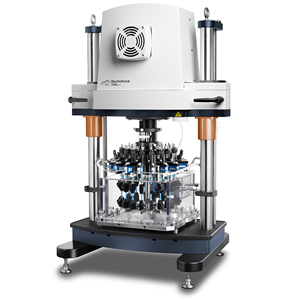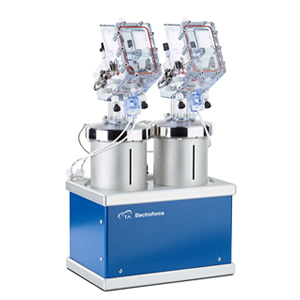View Cardiovascular Device Fatigue Brochure ElectroForce Accessories Request a Quote
Medical device testing is often aimed at evaluating a medical device’s risk of failure in patients, which is critical when device failure could result in serious harm or death. Durability testing is particularly important when implantable medical devices are intended for multi-year use and experience repeated stress and strain cycles. Cardiovascular devices such as stents, heart valves and other endovascular devices not only experience substantial stress or strain during each heartbeat cycle, but they must resist this loading repeatedly for approximately 400 million cycles for a 10-year lifetime, and 600 million for 15-year lifetime. In vitro fatigue testing to evaluate device durability against heartbeat loading is crucial for device manufacturers to gain regulatory approval such as per US FDA, European MDR and Chinese FDA requirements.
Medical device fatigue instruments are designed to simulate the real-world physiologic loading on devices, in a lab, long before they are implanted into patients. These instruments allow device manufacturers or test laboratories to evaluate if device designs are sufficiently reliable against the physiological loading of the human body. These tests are performed in a controlled environment and to prescribed physiological loading levels for repeatable and statistically significant results over many devices tested. And more recently, these instruments are often used to push devices beyond physiologic loading levels, to intentionally cause fatigue failures using hyper-physiologic loading conditions. This more aggressive approach enables device developers or researchers to more confidently identify the safety margin of their medical devices and ultimately increase patient safety with more knowledge. Failure is thus safely evaluated early in the device development process long before devices may fail in clinical trials or patient uses.
TA’s ElectroForce cardiovascular instruments have been proven over 25 years of use to deliver the industry’s fastest results and most powerful loading. Having evolved through decades and multiple design improvements, they enable earlier insights into failure modes, quicker device refinement, and ultimately faster time to market for life-saving devices. Powerful ElectroForce linear motor technology drives each fatigue instrument in the Cardiovascular Test series. These motors have impeccable durability backed with a 10-year motor warranty, powerful high-frequency operation and precise control and repeatability. The MSF16 instrument is typically used early in testing to characterize device subcomponents’ and materials’ durability and endurance limits with efficient simultaneous fatigue loading of 16 specimens. The DuraPulse SGT delivers accelerated radial fatigue loading for multiple samples deployed within mock vessels, simulating physiologic or hyper-physiological loading of almost any device to be deployed in a vessel. The DuraPulse HVT delivers fluid flow through heart valves, including transcatheter heart valves, with precise closing pressure control to deliver accelerated wear testing (AWT) at the industry’s highest frequencies. Each of these instruments are optimized to deliver device durability results quickly and easily, reducing time to regulatory approval and time to market.
Common Testing Standards
- ISO 5840 – Heart valve testing: Cardiovascular Implants — Cardiac Valve Prosthesis
- ISO 25539-1 – Cardiovascular implants — Endovascular devices
- ASTM F2477 – Test Methods for in vitro Pulsatile Durability Testing of Vascular Stents
- ASTM F3211 – Standard Guide for Fatigue-to-Fracture (FtF) Methodology for Cardiovascular Medical Devices




